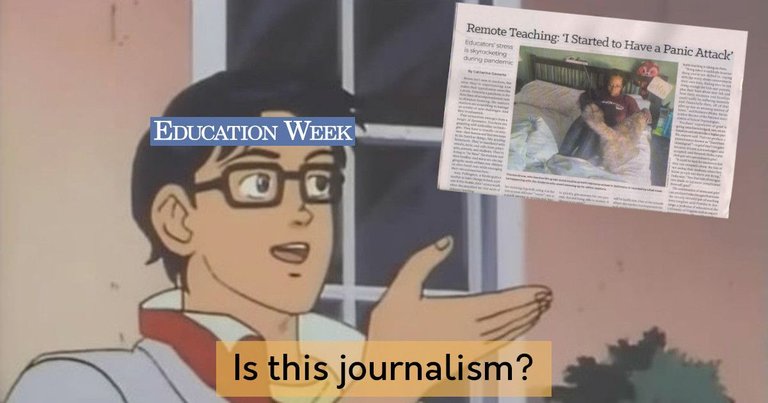
Documents that prove the popular news magazine Education Week has been taken over by a cult. #satire
Letter to the Editor (2020 May 6)
To the Editor:
Your magazine, Education Week, is near and dear to my heart. For weeks I have shelled out my (parents’) hard-earned money to receive your quality journalism in my mailbox.
Over the past two months, however, I have noticed a drop in that quality. Here are the front-page headlines of your last five issues (excluding special reports). I have bolded all phrases that raised my blood pressure:
School Districts are On the Brink (May 6 issue)
Remote Teaching: ‘I Started to Have a Panic Attack’ (April 29 issue)
Will Learning Gaps Widen as Schools Stay Closed? (April 1 issue)
When America’s Schools Shut Down, We All Lose (March 25 issue)
On March 18, you had four front-page headlines, the first two being:
With such neutral, dispassionate headlines as “I Started to Have a Panic Attack”, you may wonder what I’m so concerned about. Well, I can’t put my finger on it, but something about the phrases On the Brink, Coronavirus Collapse, Panic Attack, Shut Down, and We All Lose just unsettles me.
Your sensationalist articles have made me sicker than any virus could. You’d better get back on the straight and narrow, Mr. Editor, or I’m taking my business over to Education Dive!
Sincerely,
Raul E. McNeil
P.S. Feel free not to publish this letter; it’ll probably surface on some nobody’s blog anyway.
Kenneth Pruitt’s diary (2020 May 8)
Dear diary,
I may finally get published in Education Week. Oh, how exciting… finally, all my work as a freelance journalist has paid off!
I have joined a small religious sect of education journalists known as the Distance Learning Hacks. The Hacks are a secret order, forged by the Great Pandemic. They report on distance learning alone, and are open exclusively to the most basic and bland of education journalists.
Slowly but surely, the Hacks have infiltrated Education Week. Now that I have credit in their organization, they have invited me to one of their rituals by videoconference! I am to write an article, which shall be sacrificed to the gods. If the gods accept my sacrifice, it will be published.
I shall update you as soon as I can, diary.
—Kenneth Pruitt
Holy Book of the Distance Learning Hacks (2020 April 25)
Excerpt 1: “Preface”
Our Order began with the COVID-19 lockdown. Reporter Lisa Campbell churned out a last-minute piece on the schools closing and expected the clicks on her article to end after only one night. However, a miracle happened: the clicks lasted for eight nights.
Inspired by this miracle, Campbell realized that education journalists could get more clicks by making the pandemic seem longer. All they had to do was:
take legitimate journalism about COVID-19;
pepper it with alarming phrases such as On the Brink, Coronavirus Collapse, Panic Attack, Shut Down, and We All Lose; and
publish it week after week to scare the population.
Campbell started a religious movement around these practices. She appointed herself Giant Hack, or leader of the Hacks; many were calling her “giant hack” anyway. She amassed a following of several other Hacks, and spread Hackery across the land.
Excerpt 2: “Gods”
As a Distance Learning Hack, you are basic and bland. Your reporting will bait clicks for your god masters:
Moodlepost-Apocalypso, the goddess of treating videoconferencing and e-learning software like magical alien technology;
Reschedjuly (ree-sked-joo-lye), the god of arguing at great length whether summer vacation should be cancelled;
Pedestagram, the goddess of shareable content that blindly praises educators;
Hypertensha, the goddess of amplifying stress about the pandemic to sell vague self-care tips;
Pessimiss, the goddess of whining about the same bad news repeatedly so you can drag others into your misery;
Captain Obvious, the god of the obvious.
Kneel before your sensationalist masters, worm!
Meeting Minutes of the Hacks (2020 May 11)
These are confidential minutes of the Distance Learning Hacks. Do not publish them on your blog.
We convened at 9am Central on an 8×8 videoconference, wearing dark hoods and burning incense as they presented their offerings. Her Basicness Lisa Campbell, the Giant Hack, presided over the meeting.
“Come forth and offer your articles as sacrifices,” boomed the Giant Hack over her webcam. “If the gods deem your sacrifice clickbait, it shall be considered sacred, and published.”
A journalist named Squeaky LaFont from FuzzBead made the first sacrifice: a list titled “22 Things Teachers Need to Hear in the Pandemic.”
“The goddess Pedestagram is pleased,” announced the Giant Hack. “She especially liked thing #13, ‘Don’t give up.’”
David Foleman, from a testing company that wished to remain anonymous, brought the second offering: a two-page article called “Will COVID-19 Lower Student Achievement?”
“It took you two pages of text and scatter plots to show that viral pandemics do not improve student performance,” remarked the Giant Hack. “Congratulations: the great Captain Obvious approves your sacrifice.”
“Thank you, Captain Obvious!” chanted the congregation. They bowed in unison – or would have, if not for the spotty Internet connection.
Near the end of the videoconference, the Giant Hack asked if there were any more sacrifices.
“I have an article for Education Week,” said Kenneth Pruitt. “It’s about news media literacy in the time of the coronavirus.”
The Giant Hack paused, then sighed. “The gods do not accept your offering. News media literacy goes against everything we stand for. You are hereby demoted and reassigned to write for Scholastic News, grade four edition.”
Kenneth Pruitt’s diary (2020 May 14)
Dear diary,
At Scholastic News, I have truly learned the meaning of “basic and bland”.
—Kenneth Pruitt
@provocateach, thank you for supporting the HiveBuzz project by voting for @steemitboard as a witness.
Click on the badge to view your Board of Honor.
Once again, thanks for your support!
Do not miss the last post from @hivebuzz: